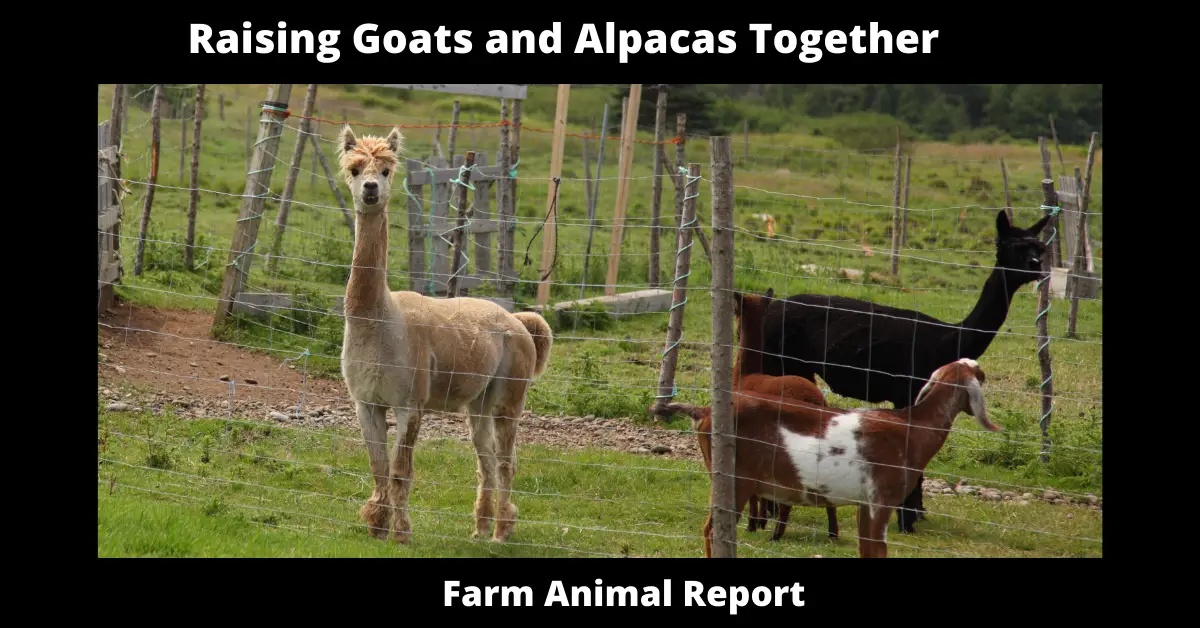As a general rule Alpacas and goats can live side by side with proper preparation, attention to vital details like indoor/outdoor space needs as well nutritional requirements. If you take care of their individual health needs (like giving them a medicated feed) then these animals will not only get along famously but also help manage cross-sharing from parasites or diseases that may be present in either species
Raising Goats and Alpacas Together
Many people raising goats and alpacas together wonder if they can keep the two animals in the same pasture. The answer is yes, but there are a few things you need to consider before doing so. Alpacas and goats require different diets and living conditions, so it’s important that you know what each animal needs to be happy and healthy before raising them together. In this article, we will talk about raising both alpacas with goats as well as keeping alpacas with other livestock such as sheep or cattle. Farmers with large flock down to hobby farms, use these protective animals.
Check Out Amazon’s Educational Resources for Raising Alpacas
Keeping Goats and Alpacas
Are Alpacas a Type of Goat?
Raising Goats and Alpacas Together – alpacas are not a type of goat. They belong to the camelid family and have many differences from goats such as having longer necks with shorter legs compared to their bodies. This is why raising them together requires special attention since they require different living conditions and diets which would be difficult to provide them with their individual nutrients
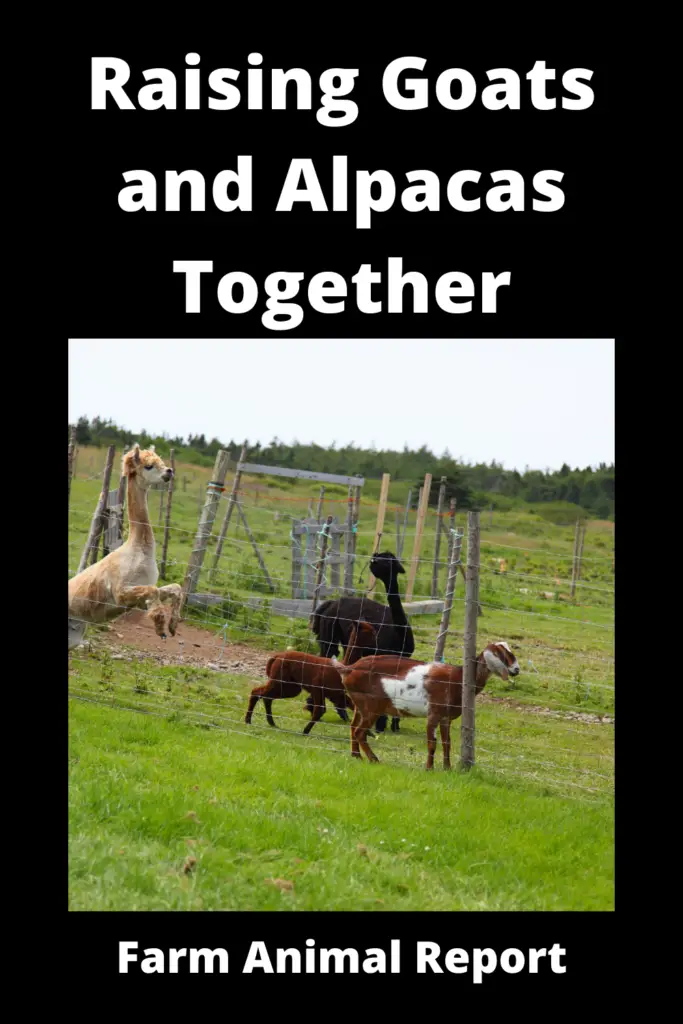
Can you keep Alpacas and Goats/ Llamas together?
Goats and Alpacas Together – Yes, raising alpacas with other livestock such as sheep or cattle is possible. It’s not recommended to raise them with large animals like bulls since they can be aggressive towards the small animal but if raised properly, it should go well. There are some things you need to consider before raising both animals together though.
18 ways Alpaca Farmers make Money
Since llamas are larger, they can be more aggressive towards the goats and may even kill them due to their weight difference between a goat which is around 100 lbs compared to a full-grown adult alpaca at 200-250lbs. You also need to provide both animals with different types of diets since while alpacas prefer grass-based feeds, goats enjoy eating alfalfa
What is the Diet of an Alpaca?
Alpacas are herbivores, and they will eat a wide range of plants. They primarily feed on grasses and hay in the wintertime, but once it warms up enough to graze outdoors, alpacas like to browse as well (eat twigs and branches).
In the wild, alpacas have been known to eat from over 100 different kinds of plants. They need a significantly diverse range of nutrients and minerals in order to stay healthy, so they will often ingest stones as well which helps with digestion by grinding the food down when it enters their stomachs.
Alpacas also like to eat fruits and vegetables, such as apples or carrots. A big part of a healthy alpaca diet includes minerals in salt blocks which can be provided for them to lick at their leisure.
Alpacas also require copious amounts of water daily to stay hydrated. They typically get enough moisture from the plants they eat, but it is important to keep a bowl of water available in case they need it.
What is the diet of a Goat?
Goats are herbivores with a diet consisting of mainly grasses and leaves, but they can eat fruit off trees. Goats will also consume bark in the winter when there is less food available to them.
A key component in their diet is salt licks that are made up of rocks or soil that have high concentrations of minerals.
See Amazons Resources on the Science of Raising Goats
If given the opportunity, goats will eat almost anything including bugs and other small invertebrates like worms to help them get their daily intake of protein. They can even eat meat if it is offered to them in small quantities because they do not have any digestive enzymes for breaking down that type of food source.
Goats are often fed hay in the winter when there is less forage available. This can be supplemented with grain if they need more calories to keep warm or gain weight.
Fencing for Alpacas and Goats
Alpacas and goats can be kept together in herds that are compatible. Both species will eat the same foods, but fencing must allow them to graze within reach of each other during continuous grazing.
Fencing should also keep out any predators who might consider alpacas or goats prey animals.
Some livestock fencing options work well for both species, but many fences used to contain goats may not hold back alpacas.
Alpacas can also be fenced off from each other with lightweight fencing panels that are designed specifically for containing animals without making escape difficult.
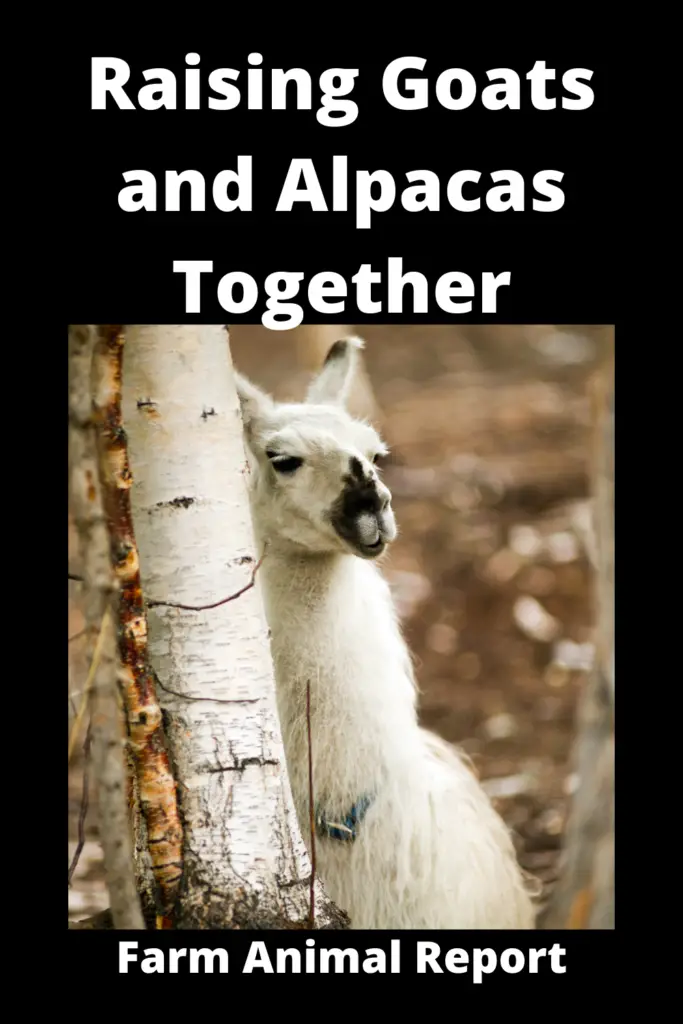
A simple electric fence will work as an effective barrier between the two types of livestock, but the alpacas will need to be trained to respect it.
Goats are more likely than alpacas to test fences for weaknesses, so they should have a lower-voltage shock if fencing is built around both species sharing an area.
The last consideration when planning fencing options is how much space each type of livestock needs.
Goats require more room than alpacas, who are smaller and less active.
Alpacas should be given about four to six feet of space per animal, while goats need between ten and twelve feet.
This means that the total number of animals sharing a pasture will also affect fencing needs for each species. A general rule is to allow four feet of fence per goat and six feet for each alpaca.
In conclusion, goats and alpacas can be kept together without incident as long as fencing requirements are taken into account prior to bringing them home. Fencing needs will vary depending on the types present in a herd and also how much space they
Which are friendlier Alpacas or Llamas?
Alpacas and Llamas are both herbivorous species of South American camelids, which means they eat only plants. While they share many common characteristics such as size (both can grow to about four feet tall), behavior (they like company), and the fact that their poop doesn’t smell bad at all (!), there is one thing that separates them: their temperament.
Llamas have domesticated about five thousand years ago, while alpacas have been bred by humans for around two and a half thousand years only. Llamas are the larger ones of the two and they tend to be less friendly than Alpacas; but on the other hand, they’re also less sensitive and more independent. Alpacas, on the other hand, are known to be very friendly with humans as well as their llama friends; however, they do need a little bit of human presence in order not to feel lonely or scared.
Alpacas can actually die of sadness if you leave them alone for too long. For this reason, it’s important to keep their environment as stable and constant as possible. They’re also very sensitive creatures, so you have to be careful with them too. Don’t startle or scare them because they might run away or hurt themselves by accident!
Will llamas protect goats?
Raising goats with llamas is a good idea if they are raised together from birth. They are Both Herd animals (hardy animals) and Llamas and Alpacas will protect Goats from danger and natural predators. They will also look after and protect smaller goats.
Llamas will protect goats if they are raised together. However, raising alpacas and llamas together can be very dangerous because the two species tend to fight with each other during the breeding season.
It is wiser to either have either alpacas or Llamas – Unless you are an experienced Llama Farmer.
Raising Alpacas and Llamas together is difficult.
Conflict when raising alpacas and llamas together is inevitable because of several reasons. Raising llamas and alpacas together is difficult because both will try to establish dominance over the other, which can be dangerous for one or both animals involved in this relationship. Raising these animals together could cause them to fight with each other almost constantly if they are not raised properly from a young age, resulting in injury to one or both animals
. Raising alpacas and llamas together is difficult because they will not produce offspring if you try cross-breeding them, so it’s important that the owner of these animals know this before attempting to raise them together. Raising llamas and alpacas can be dangerous for owners as well since they might become territorial as they mature and will try to establish dominance over the owner.
Raising alpacas with llamas is difficult because these animals can be aggressive, even if both are well socialized from a young age together. Raising alpacas with llamas is not recommended since there are much other livestock that you could raise on your farm that will get along better and not cause conflict with each other.
Raising llamas and alpacas together is difficult because they both require a specialized diet, which may become costly to provide for them or you could end up giving one animal or the other the wrong kind of food, resulting in illness.
Raising these animals together is also more expensive because you will need to purchase two of everything instead of one. Raising alpacas and llamas together is difficult because they both require special fencing that can be expensive if your property does not already have it in place or enough space for them. Raising these animals together requires more land than if raising only one animal since the pasture must accommodate all
What are Some Parasites that Alpacas and Goats Share?
Alpacas are prone to many parasites, some of which are similar or the same as other livestock. There are different types of worms alpacas can get that range in size and danger level. One type is called “abomasal worms” – alpaca parasites– goat parasites live. These inside the alpaca’s abomasum (fourth stomach), and alpacas generally show no symptoms of anemia or malnutrition. However, if alpaca parasites- goat parasites live is not treated it can cause death within two weeks. There are also other types outside the digestive tract that alpacas share with goats; lungworms in particular are common between alpacas and goats.
Other alpaca parasites- goat parasites live that alpacas share with goats include stomach bugs, lice, and mites. In terms of treatment for these alpaca parasites-goat parasites lives, many alpaca farmers use a product called “Ivermectin” on both alpacas and goats.
How Does an Alpacas Guard Goats ?
They would rather be together, in groups of two or more, when they sleep at night to keep each other safe and warm. They will choose one alpaca that is the lookout during their rest time so that there can always be someone on guard while everyone else is resting.
Alpaca / Llama will protect animals it is guarding by the following
- Keen Eyesight
- Acute Hearing
- Giving an alarm call
- Separate herd away from a predator
- Some will try to run and stomp a predator down
Will all Llamas / Alpacas guard livestock?
No, not all Llamas and Alpacas (female alpacas and Male alpacas) will guard livestock. Some may be more inclined to protect or some just don’t have the instinct for it. Most importantly though is you need a protector that matches your herd’s size and temperament.
How you can encourage an alpaca to guard livestock if it is something they would be interested in doing?
There are a few ways to encourage an alpaca to guard livestock. The first way, and the easiest way, is having another protector already guarding your herd or flock. This can work especially well with breeding pairs who have been together for years. Another option is letting them see other herd members being guarded. You can also train them to associate herding animals with a treat or toy, such as feeding your alpaca when sheep are nearby. How long does this instinctual behavior last in an alpaca?
It is important that you understand how hard it is for a protector to switch from one herd or flock they have been guarding to another. So if you are switching flocks or herds, this should be done all at once. How long it takes for the protector to adjust will depend on how quickly they can move past their lost herd/flock and form a bond with your new one.
How do I know if my Alpaca is Guarding Livestock?
There are several ways you can determine if your alpaca is guarding livestock. One way is to watch them for several days and see what they do when other animals are nearby, especially herding-type animals like sheep or goats. How much space should I provide my herd members with?
The best option would be a large pasture grass where the protector has plenty of room to separate your herd members from any predators. when you cross graze both animals you can watch their behaviors.
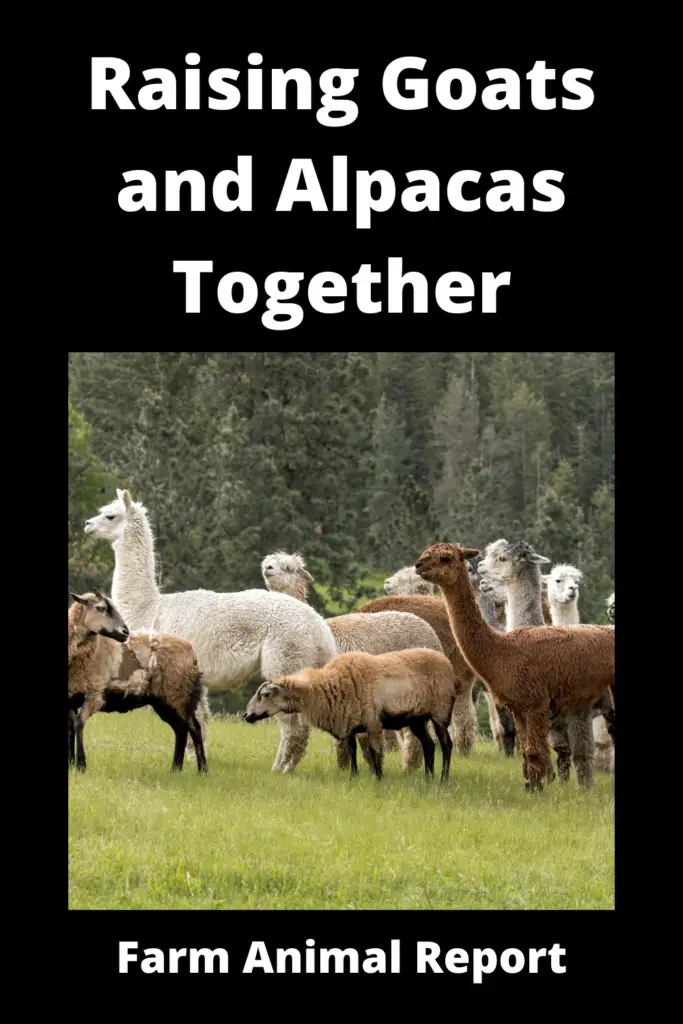
How do I know if my Alpaca is the Right size to Guard Livestock?
It’s important that you match the protector with their “flock” or “herd”. If they are too big, smaller animals may be injured by an accidental kick during a confrontation with another animal. How much training is involved in training an alpaca to guard livestock?
This will vary from one protector to another, but it’s important that the animal understands its role as a guardian before you introduce them to other animals.
Keeping an eye out for Signs your herd members may be fighting with your llama or alpaca, would include head butting, kicking out at each other, and vocalizations.
- Do alpacas look after goats?
- Can alpacas live with pygmy goats?
What Animals Can you put with Alpacas?
- Goats
- Sheep
- Cattle
- Chickens
- Horses
- Ponies
Alpacas are herd animals, so it is best to have at least two of them. You can put a variety of other farm animals with alpacas including sheep and goats, but you should take some precautions before doing so. Alpaca breeders warn that pigs often chase the alpacas around their pen.
Sheep accept alpacas as leaders and will follow them around.
Goats tend to get along with alpacas well too, but be aware that they can occasionally become aggressive or territorial–especially when feeding time comes.
If you are introducing a predator such as a dog into the mix, make sure it is a small breed and a young pup, as they are less likely to be seen as a threat.
In general, alpacas do well with all types of farm animals including horses and cows. Make sure that you have plenty of room for them in their pen or pasture, but keep in mind that most will not bother to jump the fence.
Will Alpacas Protect Chickens?
Alpacas are gentle animals that won’t harm the chickens.
Many people are finding that adding alpacas to their flock is a great way to protect them from predators. Because of the physical appearance, it’s unlikely for an animal or human passing by to try and mess with your chickens. Alpacas themselves are not known as aggressive animals but will definitely make some noise if they feel threatened.
You also have the added benefit of Chickens helping to control Pasture Parasites.
How do Alpacas Behave around Horses?
Alpacas and horses can live together if they are introduced correctly. If you introduce a horse to an alpaca it is best not to let the other out until the meeting has been monitored by someone who knows what they’re doing, as there will be potential for conflict between them at first. The size of your property and your relationship with your neighbors will also be considered.
Most native to South America, alpacas can live in a wide range of climates and so are able to cope with most things that the British climate throws at them! Although they are similar in size, shape, and general appearance to llamas, Alpacas have many differences which make them more suited as pets to humans.
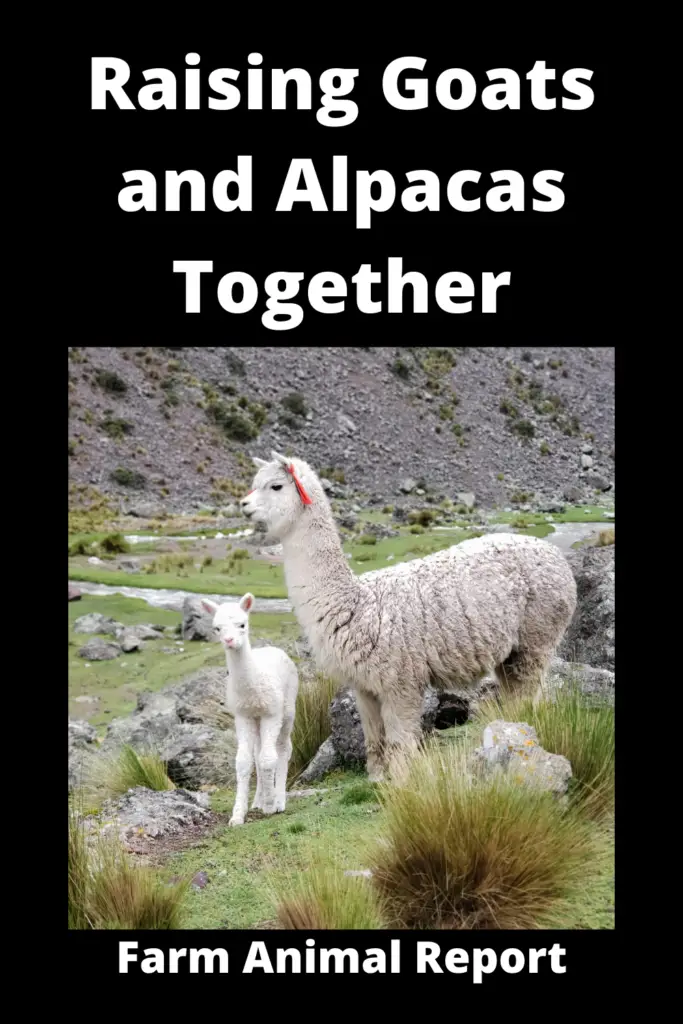
There are many breeds of alpaca, each with different characteristics so it is important that you choose carefully before purchasing any for your property. Once introduced correctly the relationship between an Alpaca and a horse can be very rewarding indeed!
This would also include
- Horses
- Ponies
- Mini Ponies
Final Thoughts
In conclusion, goats and alpacas can be kept together without incident as long as fencing requirements are taken into account prior to bringing them home. Fencing needs will vary depending on the types present in a herd and also how much space they need.


